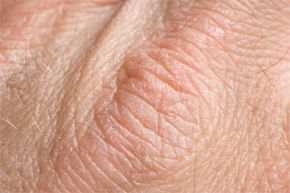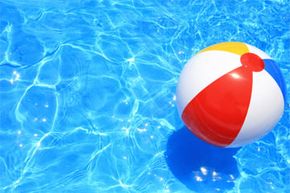Stretch out an arm right now, preferably yours. Situate said arm so you can examine the skin on your knuckles. Do your knuckles look more cracked and parched than a desert tortoise's? They might. That's because your skin has dried out.
Why does your skin dry out? It helps to start by reviewing your skin's neat system for trapping moisture. The first stop is the epidermis, the outermost layer of skin, which covers you from your scalp to your toenails. Think of it as the body's outerwear. Although less than a millimeter thick, the epidermis has layers, just like a ski jacket [source: Whitton]. The stratum corneum, its top layer, is made of dead skin cells. These cells grab water using their filling -- natural moisturizing factors (NMFs), amino acids and other molecules that absorb water from the air and lock it inside the cell. In dry climates, our cells make more NMFs to stay moisturized [source: Rawlings].
Advertisement
A layer of fat sits below the stratum corneum. Ceramides, cholesterol and fatty acids are some of the fats you'll find here, arranged into layers of jelly and liquid [source: Bonté]. When water tries to evaporate from lower layers of the skin, it gets trapped in spaces between the fat molecules and can't rise any higher. The layers also give water too far to travel to reach the surface of the skin [source: Rawlings].
Next, we're on to the stratum granulosum. Its top half is almost watertight, the cells being sewn together by a type of protein thread [source: Bonté, Becker]. The bottom is waterlogged. Channels let water from deeper layers into this layer, but not out.
Last but not least is the stratum spinosum at the bottom. Cells in this layer sport hyaluronic acid, a sugar that binds to water, on their surfaces.
If our skin is built to hang on to moisture, then why does it dry out? Our genes, our age, evaporation and osmotic pressure all make a difference. And what a difference they make. Dry skin grays with dead cells and forms rashes and, just in case we didn't notice, itches and stings.
Our dry skin has a good reason to complain. It's troubled below. Housekeeping enzymes in our skin need water to work. When our skin dries, these enzymes falter, and the skin has trouble keeping water in and infections out. And for people with skin conditions, drying and cracking can open the already weak barrier, admitting skin bacteria like Staphylococcus species, for a gnarly infection [source: Aftergut].
Read on to learn more about some biological causes of dry skin.
Advertisement

